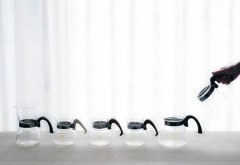Vienna Cafe, once a global intelligence and political center
Although the Viennese coffee culture slogan, "I'm not in the cafe, I'm on the way to the cafe," has long been well known, it can only be experienced by sitting in a cafe in Vienna, where drinking coffee is more than just killing time.
Viennese cafe culture flourished from the end of the 19th century to the beginning of the 20th century. At that time, the cafe was the most important social occasion in Vienna's cultural circles, and the people who patronized it were generally dressed in suits. Although the times are changing, the rules of the Vienna Cafe have not changed much, so when you walk into the old-fashioned cafe hall, customers still have to dress appropriately in order to be welcomed. But if it is really the first time to visit the door, no offense, the service staff here will also respond with a kind smile. However, customers who wear sneakers will be advised to sit at an ordinary coffee table with a sunshade outside and taste the same coffee, which is a compromise.
Some people say that more than 40 kinds of coffee can be tasted in the cafes in Vienna, while others say that there should be more. But people who are willing to come to the Vienna Cafe actually prefer the atmosphere here.
Before World War I, it was often full of European playwrights, artists and musicians. The Viennese call it the cradle of Austrian poetry, plays and novels. Although we all have different ideas, we can always exchange views openly in the face of fragrant coffee. Such stories are recorded by Viennese in murals and old photos and posted on the walls of cafes. One of the favorite stories takes place between the composers Brahms and Bruckner. The two often clash with each other because of their different views on music creation, and the most famous one took place in a cafe in Vienna. Bruckner sat at a separate table and ordered a cup of coffee with whipped cream. Brahms exclaimed, "you and I may have only one thing in common." Having coffee with Viennese, the other person can't help laughing and tell you this old story again.
It is not only Brahms and Bruckner who fell in love with the Vienna Cafe. Former music masters Mozart, Beethoven, Schubert, Waltz Dynasty Strauss and son are all regulars here. Vienna Cafe is famous, coupled with its location in Western Europe, coffee here is not cheap. An ordinary cup of coffee costs five or six euros, while the price of two cups of coffee can buy a large can of instant coffee at the local supermarket.
But in the Viennese Cafe, anyone can order a cup of coffee and stay here for as long as possible without being abused by the waiter. On the contrary, if you see that your cup of coffee is empty, the waiter will take the initiative to bring a cup of water and put it on the table. This is not a disguised "eviction order" in a Vienna cafe, but I really hope you continue to enjoy your time in the cafe. Locals say the tradition of "drinking water after coffee" stems from the local housing crisis of the 19th and 20th centuries. Many Viennese residents lived in slums for a long time, with nearly 1500 suicides in 1913. At that time, there were many homeless people who ended up hiding in cafes to pass the time. And the kind-hearted cafe owners are also willing to accept the small change that customers have left for coffee and kindly let them stay warm and hide here.
In fact, Vienna Cafe was not the first to sell coffee, but information. The history of Viennese drinking coffee dates back to the 17th century. At that time, Europeans didn't know what coffee was. In 1683, Turkey attacked Vienna for the second time, and Austria finally won the support of Poland and defeated the Turkish army. Fleeing Turkish troops seized hundreds of bags of coffee beans on the battlefield around the walls of Vienna, where one of the Polish soldiers seized them before opening the first coffee shop in Vienna's history.
Because it is "imported", coffee has not been widely accepted by the Viennese for a period of time. So many cafes in Vienna thought of providing free newspapers to attract customers, because newspapers were very expensive at that time, and a newspaper cost twice as much as a cup of coffee. Since then, the culture of reading newspapers in cafes has gradually sprung up in Vienna.
Vienna is a German-speaking city, but the cafe in Vienna is a "United Nations". It not only has customers who speak all kinds of languages, but also has the densest exchange of information in the world. As a result, the Vienna Caf é was also known as the "global intelligence center" and the "political center". A hundred years after World War I, the Viennese can still clearly point out to you which cafes in Vienna Hitler, Trotsky, Tito and Stalin, the former political strongmen, lingered a century ago.
Today, in the cafes in Vienna, you can still see some local and even European dignitaries being interviewed by the media, and customers who are strangers to each other can also find like-minded discourse partners from the cakes, newspapers and chess on the table. ignite the passion of talking to each other and enjoy the wonderful time that only the Vienna Cafe can bring to them.
Important Notice :
前街咖啡 FrontStreet Coffee has moved to new addredd:
FrontStreet Coffee Address: 315,Donghua East Road,GuangZhou
Tel:020 38364473
- Prev

Death-themed Cafe in Australia
Death is not a topic that everyone wants to talk about, especially sitting at the table, having a cup of coffee, having a snack, and talking about death. Many people may feel a chill in their spine. However, this once taboo topic has become a hot topic on the coffee table. Death-themed cafes have sprung up all over the world in order to provide a security
- Next

A fresh and natural Japanese cafe
Fresh and natural style of the Japanese cafe, providing boutique hand coffee and private snacks, the comfortable environment is too desirable!
Related
- What documents do you need to go through to open a coffee shop? coffee shop coffee shop certificate processing process
- How to purchase Coffee beans in small Cafe how to choose a suitable supplier for domestic Coffee supply Company
- How to drink Starbucks Fragrance White Coffee? how to make Australian White Coffee? what Italian coffee beans are recommended?
- The Story of Flora Coffee: the name of Flora Coffee Bean and the implication of the Flowers on Florna Coffee
- How much does a cup of coffee cost? How much is the profit of a cup of coffee? What is the profit of the coffee shop in a year?
- Yunnan small Coffee, known as "fragrant Coffee", introduces the characteristics of Alpine Arabica Coffee producing areas in Yunnan, China
- 2023 latest Starbucks full menu price list how much is a cup of Starbucks coffee what is better to drink the most popular hot and cold drinks recommended
- Starbucks different kinds of Coffee Price list Starbucks menu 2023 Top Ten Best drinks in Starbucks
- Starbucks Spring praise Comprehensive matching Coffee Bean theme Story Packaging implication and taste description
- The cost of a cup of coffee latte American coffee cost price and selling price

